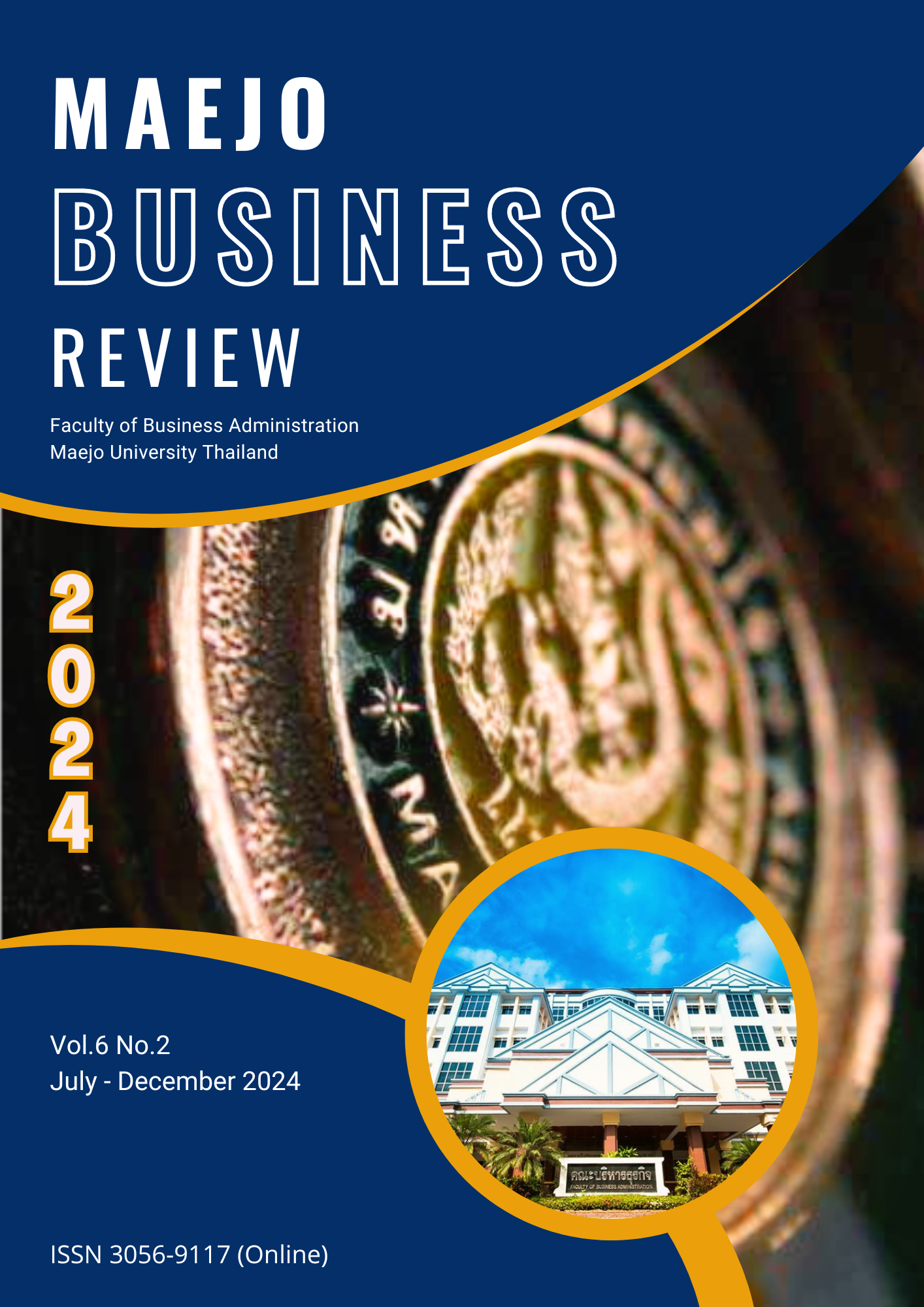ปัจจัยที่มีอิทธิพลต่อการใช้ระบบวางแผนทรัพยากรแบบคลาวด์และผลการดำเนินงาน ของบริษัทจดทะเบียนในตลาดหลักทรัพย์แห่งประเทศไทย
DOI:
https://doi.org/10.14456/mbr.2024.11คำสำคัญ:
คลาวด์, คุณภาพของระบบ, คุณภาพของสารสนเทศ, คุณภาพการให้บริการ, ผลการดำเนินงาน, ระบบวางแผนทรัพยากรบทคัดย่อ
ในปัจจุบัน เทคโนโลยีสารสนเทศที่นำมาประยุกต์ใช้กับการดำเนินงานของกิจการมีการพัฒนาอย่างรวดเร็ว ทำให้หลายกิจการต้องการแสวงหาระบบสารสนเทศที่ใช้เทคโนโลยีสมัยใหม่เพื่อช่วยในการประมวลผลการปฏิบัติงานและนำเสนอข้อมูลที่ถูกต้อง ทันเวลา เพื่อเป็นประโยชน์ในการตัดสินใจของผู้บริหาร งานวิจัยนี้จึงมีวัตถุประสงค์เพื่อศึกษาผลกระทบของปัจจัยที่มีอิทธิพลต่อการใช้ระบบวางแผนทรัพยากรแบบคลาวด์ (ระบบ Cloud ERP) ตามกรอบแนวคิดของ DeLone และ McLean โดยกำหนดให้ คุณภาพของระบบ คุณภาพของสารสนเทศและคุณภาพการให้บริการ เป็นตัวแปรอิสระที่มีผลกระทบต่อการใช้ระบบวางแผนทรัพยากรแบบคลาวด์ นอกจากนี้ ยังได้ทำการศึกษาผลกระทบของการใช้ระบบ Cloud ERP ที่มีต่อผลการดำเนินงานขององค์กร กลุ่มตัวอย่างที่ใช้ในการศึกษาครั้งนี้ ได้แก่ บริษัทจดทะเบียนในตลาดหลักทรัพย์แห่งประเทศไทย จำนวน 166 บริษัท โดยใช้แบบสอบถามเป็นเครื่องมือในการเก็บรวบรวมข้อมูล ผลการวิจัยพบว่า คุณภาพของระบบ คุณภาพของสารสนเทศ และคุณภาพการให้บริการ มีผลกระทบเชิงบวกต่อการใช้ระบบ Cloud ERP และการใช้ระบบ Cloud ERP มีผลกระทบเชิงบวกต่อผลการดำเนินงานขององค์กรทั้งที่เป็นตัวเงินและไม่เป็นตัวเงิน
เอกสารอ้างอิง
ตลาดหลักทรัพย์แห่งประเทศไทย. (2567/3/1). รายชื่อบริษัทจดทะเบียนในตลาดหลักทรัพย์. https://www.set.or.th
Aaker, D. A., Kumar, V. & Day, G. S. (2001). Marketing Research. (International ed.). John Wiley and Sons.
AlMuhayfith, S. & Shaiti, H. (2020). The impact of enterprise resource planning on business performance: with the discussion on its relationship with open innovation. Journal of Open Innovation Technology Market and Complexity, 6(3), Article 87. https://doi.org/10.3390/joitmc6030087
Alsharari, N. M. (2021). Institutional change of cloud ERP implementation in public sector – a transformation of strategy. International Journal of Disruptive Innovation in Government, 1(1), 2-14. https://doi.org/10.11008/IJDIG-03-2019-0002
Armstrong, S. J. & Overton, T. S. (1977). Estimating non-response bias in mail surveys. Journal of Marketing Research, 14(3), 396-402. https://doi.org/10.1177/002224377701400320
Azhar, Z., Quah, K. W. J. & Goh, J. Y. (2022). Cloud ERP and value creation: a case study of EngCo. Global Business and Management Research: An International Journal, 14(3), 367-370.
Black, K. (2006). Business Statistics: for Contemporary Decision Making (4th ed). John Wiley and Sons.
Chaveesuk, S. & Hongsuwan, S. (2017). A structural equation model of ERP implementation success in Thailand. Review of Integrative Business & Economics Research, 6(3), 194-204.
Cheng, Y.-M. (2020). Understanding cloud ERP continuance intention and individual performance: a TTF-driven perspective. Benchmarking: An International Journal, 27(4), 1591-1614. https://doi.org/10.1108/BIJ-05-2019-0208
DeLone, W. H. & McLean, E. R. (1992). Information systems success: the quest for the dependent variable. Information Systems Research, 3(1), 60-95. https://doi.org/10.1287/isre.3.1.60
DeLone, W. H. & McLean, E. R. (2003). The DeLone and McLean model of information systems success: a ten-year update. Journal of Management Information System, 19(4), 9-30. https://doi.org/10.1080/07421222.2003.11045748
Ghani, E. K., Yasin, S. A. M. & Ali, M. M. (2019). Examining enterprise resource planning post implementation and employee’s performance in small and medium enterprises using DeLon and McLean’s information system success model. International Journal of Financial Research, 10(3), 153-169. https://doi.org/10.5430/ijfr.v10n3p153
Gupta, S., Kumar, S., Singh, S. K., Foropon, C. & Chandra, C. (2018). Role of cloud ERP on the performance of an organization – contingent resource-based view perspective. The International Journal of Logistics Management, 29(2), 659-675. https://doi.org/10.1108/IJLM-07-2017-0192
Hadidi, M., Al-Rashdan, M., Hadidi, S. & Hussein, Y. S. (2020). Comparison between cloud ERP and traditional ERP. Journal of Critical Reviews, 7(3), 140-142. https://doi.org/10.31838/jcr.07.03.26
Hair, J. F., Black, W. C., & Anderson, R. E. (2006). Multivariate Data Analysis (6th ed). Pearson Education International.
Hayek, W. Y. A. & Odeh, R. A. A. (2020). Cloud ERP vs On-premise ERP. International Journal of Applied Science and Technology, 10(4), 55-60. https://doi.org/10.30845/ijast.v1n4p7
Jayeola, O., Sidek, S., Rahman, A. A., Mahomed, A. S. B. & Jimin, H. (2020). Contextual factors and strategic consequences of cloud enterprise resource planning (ERP) adoption in Malaysian manufacturing SMEs: a conceptual framework. International Journal of Economics and Business Administration, 8(3), 176-201. https://doi.org/10.35808/ijeba/495.
Lin, H.-Y., Hsu, P.-Y. & Ting, P.-H. (2006). ERP systems success: an integration of IS success model and balanced scorecard. Journal of Research and Practice in Information Technology, 38(3), 215-228.
Lutfi, A., Al-Okaily, M., Alsyouf, A. & Alrawad, M. (2022). Evaluating the D&M IS success model in the context of accounting information system and sustainable decision making. Sustainability, 14(3). https://doi.org/10.3390./su14138120
Marika, N. M., Litondo, K., Njihia, M. & Wainaina, G. (2023). eERP system usage and supply chain performance in manufacturing firms in Kenya. African Journal of Business and Management, 8920, 75-88.
Marinho, M., Prakash, V., Garg, L., Savaglio, C. & Bawa, S. (2021). Effective cloud resource utilisation in cloud ERP decision-making process for industry 4.0 in the United States. Electronics, 10(8). 959. https://doi.org/10.3390/electronics10080959
Nguyen, T. D. & Luc, K. V. T. (2018). Information systems success: empirical evidence on cloud-based ERP. In Dang, T., Kung, J., Wagner, R., Thoai, N., Takizawa, M. (eds), Future Data and Security Engineering. FPSE2018 Lecture Notes in Computer Science, November, pp. 471-485. https://doi.org/10.1007/978-3-030-03192-3_36
Nunnally, J. C. & Bernstein, I. H. (1994). Psychometric Theory (3rd ed). McGraw-Hill.
Ruivo, P., Johansson, B., Sarker, S. & Oliveira, T. (2020). The relationship between ERP capabilities, use, and value. Computers in Industry, 117, Article 103209. https://doi.org/10.1016/j.compind.2020.103209

ดาวน์โหลด
เผยแพร่แล้ว
รูปแบบการอ้างอิง
ฉบับ
ประเภทบทความ
หมวดหมู่
สัญญาอนุญาต
ลิขสิทธิ์ (c) 2024 Maejo Business Review

อนุญาตภายใต้เงื่อนไข Creative Commons Attribution-NonCommercial-NoDerivatives 4.0 International License.









